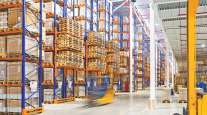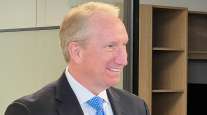Bloomberg News
Union Pacific Will Limit Traffic to Clear Clogged Rail Lines

[Stay on top of transportation news: Get TTNews in your inbox.]
Union Pacific Corp. plans to limit customer-owned railcars on its network beginning next week to ease traffic jams that have gummed up the supply chain.
The railroad said in a letter to customers that it would begin metering traffic after April 18 if customers don’t voluntarily reduce their inventory before then. Union Pacific also said it is removing 2% to 3% of its own railcars and has added 50 locomotives since January with plans to bring on 100 more to help move cars along.
“The operating inventory levels continue to rise on a daily basis,” Kenny Rocker, Union Pacific’s sales and marketing chief, said in the letter published on its website April 11. “We have already identified and notified those customers who can help us manage the current congestion by reducing their railcar inventories.”
The industry has struggled with soaring freight since the pandemic drove higher demand for goods, choking the nation’s supply chain. The situation prompted the U.S. Surface Transportation Board to call public hearings later this month to hear from all the major railroads on steps to improve network fluidity, citing a broad worker shortage and railroads’ “bare bones” cost-cutting.
“The railroads simply do not have a sufficient number of employees,” board Chairman Martin Oberman said in a statement last week.
Union Pacific said in its letter that it has transferred 80 crew members to help in congested areas and has 450 employees in training that will be ready for locomotives in summer.
The moves come after Union Pacific took steps last July to ease a backup in Chicago, where trailers weren’t being unloaded fast enough amid a crush of traffic. The company halted all containers at the time from Los Angeles to Chicago for about a week.
In a new statement, Union Pacific said the latest attempt to meter railcars will help it work through the backlog, echoing the “approach we successfully applied last year with West Coast intermodal traffic.”
Want more news? Listen to today's daily briefing below or go here for more info:




